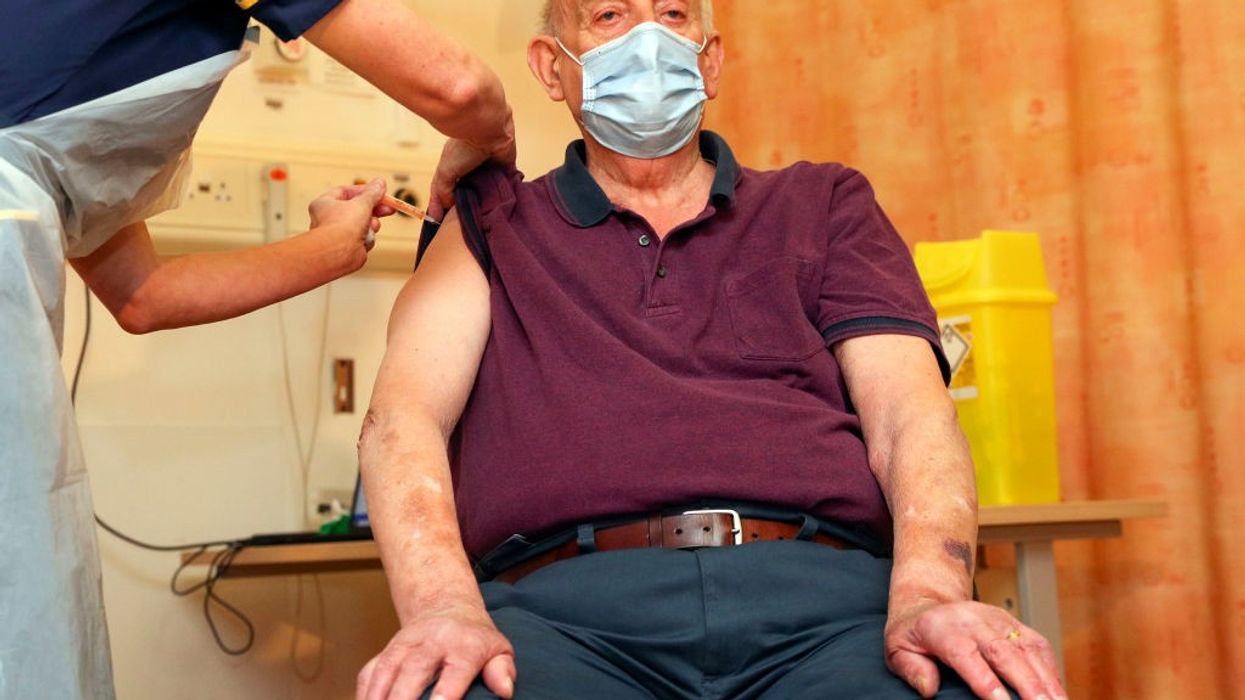BRITAIN began vaccinating its population with the Covid-19 shot developed by Oxford University and AstraZeneca on Monday(4), touting a scientific "triumph" that puts it at the vanguard of the West in inoculating against the virus.
Britain, which is rushing to vaccinate its population faster than the United States and the rest of Europe, is the first country to roll out the Oxford/AstraZeneca shot.
It rolled out the Pfizer and Germany's BioNTech vaccine last year.
Dialysis patient Brian Pinker, 82, was the first to get the Oxford/AstraZeneca shot at 0730 GMT at Oxford University Hospital, just a few hundred metres from where the vaccine was developed.
"I am so pleased to be getting the Covid vaccine today and really proud that it is one that was invented in Oxford," Pinker, a retired maintenance manager who has been having dialysis for kidney disease, said.
He was looking forward to celebrating his 48th wedding anniversary with wife Shirley in February.
"The nurses, doctors and staff today have all been brilliant," he said.
Alongside Brian, music teacher and father-of-three Trevor Cowlett, aged 88, and Professor Andrew Pollard, a paediatrician working at OUH who also pioneered the Oxford jab, were among the first to receive the vaccine.
Hundreds of new vaccination sites are due to come onstream this week, joining the 700 which are already in operation, the NHS said.
Professor Stephen Powis, NHS medical director, said: “The NHS’ biggest vaccination programme in history is off to a strong start, thanks to the tremendous efforts of NHS staff who have already delivered more than one million jabs.
“Throughout the pandemic their response has been phenomenal from introducing world-leading treatments for coronavirus which have saved patients’ lives as well as delivering the very first covid-19 vaccines outside of a trial in a landmark moment in history, and now rolling out the new Oxford AstraZeneca vaccine, chalking up another world first that will protect thousands more over the coming weeks.”
According to NHS, the first Oxford AstraZeneca vaccinations will be delivered at a small number of hospitals for the first few days for surveillance purposes, before the bulk of supplies are send to hundreds of GP-led services later in the week.
The NHS is giving GPs an extra £10 for every care home resident that they vaccinate by the end of the month.
Professor Andrew Pollard, director of the Oxford Vaccine Group and chief investigator of the Oxford Vaccine Trial, said: “It was an incredibly proud moment for me to have received the actual vaccine that the University of Oxford and the AstraZeneca teams have worked so hard to make available to the UK and the world. As a paediatrician specialising in infections, I know how important it is that healthcare workers along with other priority groups are protected as soon as possible - a crucial role in defeating this terrible disease.”
Britain has put more than a million Covid-19 vaccines into arms already - more than the rest of Europe put together, health secretary Matt Hancock said.
"That's a triumph of British science that we've managed to get where we are," Hancock told Sky. "Right at the start, we saw that the vaccine was the only way out long term."
Prime minister Boris Johnson’s government has secured 100 million doses of the Oxford/AstraZeneca vaccine which can be stored at fridge temperatures between two to eight degrees, making it easier to distribute than the Pfizer shot.
Six hospitals in England are administering the first of around 530,000 doses Britain has ready. The programme will be expanded to hundreds of other British sites in coming days, and the government hopes it will deliver tens of millions of doses within months.
Britain last month became the first country to use a different vaccine produced by Pfizer and BioNTech, which has to be stored at very low temperatures.
Cases of Covid-19 in Britain have risen sharply in recent weeks, fuelled by a new and more transmissible variant of the virus. On Sunday(3) there were nearly 55,000 new cases and in total more than 75,000 people in the country have died with Covid-19 during the pandemic - the second highest toll in Europe.
Johnson said on Sunday that tougher restrictions were likely to be introduced, even with millions of citizens already living under the strictest tier of rules.





